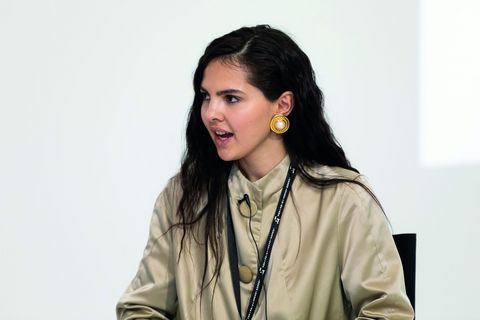Sectors & markets
Slow Fashion

INFO speaks with model and fashion influencer Doina Ciobanu about the demand for fast fashion and how the industry should act more sustainably
How are approaches to education changing? This is amongst the trickiest of questions. Like any global business-to-consumer industry, it works in a circular manner where its sustainability, or lack of it, starts at sourcing and production, and ends with the consumer, who has the responsibility to consume responsibly. Supply and demand rests in our hands. But as long as we expect fast, cheap and disposable products, the fashion industry is going to cater to that demand. The problem is that more than 99 percent of people globally are purchasing mass-produced goods from fast-fashion retailers. It would be exciting to see fast-fashion retailers improve their supply chain and production. They will always have a far bigger impact on the environment than all the small manufacturers or luxury fashion houses combined.
What brands do you think are setting the best example in the industry? In the past few years I have seen the bright side of fashion and it’s been such a beautiful and hopeful experience. Companies like Bottle Top are giving us a completely new angle of fashion accessories by using bottle tops in a very Paco Rabanne kind of way. The AYA label are making swimwear out of recycled fishing nets. Isko, a Turkish denim supplier, are pushing for new technologies in denim production by reducing water and harmful substance usage.
What is the role for influencers like yourself? I look at today’s new era of online voices as a phenomenal moment in history, democracy and freedom of speech. However, I think that the voice that you have is empowered by people – whether you’re an actor, singer, politician or fashion influencer – and it comes with enormous responsibility. When widespread global communities are looking at you for inspiration, you simply cannot miss the opportunity to bring awareness to social and political issues. Maybe I’m just a desperate idealist, but I strongly believe that we can do so much good if we use our influence for good.
Haute couture is traditionally associated with exclusivity, and brands often destroy stock to maintain their scarcity – are these practices at odds with a sustainable future? Haute couture by its nature is not unsustainable, because it is bespoke and usually has a very ethical work force behind it. On whether scarcity and exclusivity are incompatible with sustainability, absolutely not. The future of sustainable fashion should be exclusive, but not based on wealth and archaic social hierarchies, rather it should be based on production quantity. Haute couture should serve as the production and sales model
for slower fashion. Having said that, the presence of ‘stock destruction’ still horrifies me and I can’t believe governments haven’t imposed penalties. I truly hope that can change soon.
You have been a vocal advocate to reduce plastic usage. What role can the fashion industry play in this transition? A massive one. The fashion industry, along with music, entertainment and sports, have a massive audience on social media and in the press. Having this extra exposure really gives a phenomenal platform to speak about important issues and spread awareness, either as a company or as a public individual. That’s why I am always eager to encourage my friends and acquaintances to discover the world, self-educate and stand for something publicly. It doesn’t have to be plastic reduction specifically, it can be ocean pollution, renewable energy, or consumerism. If you’re not also using your platform for good, you’re is just letting it go to waste, and we simply cannot afford that with the environmental crisis deadlines we are facing.